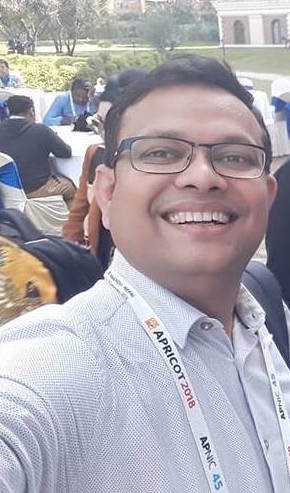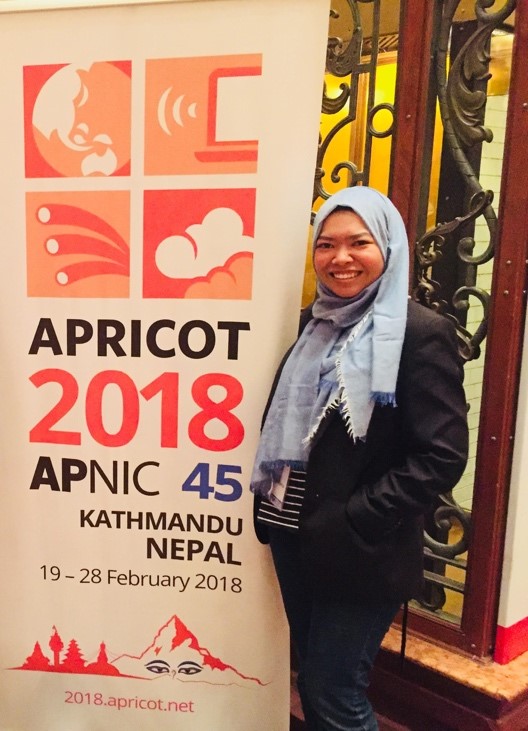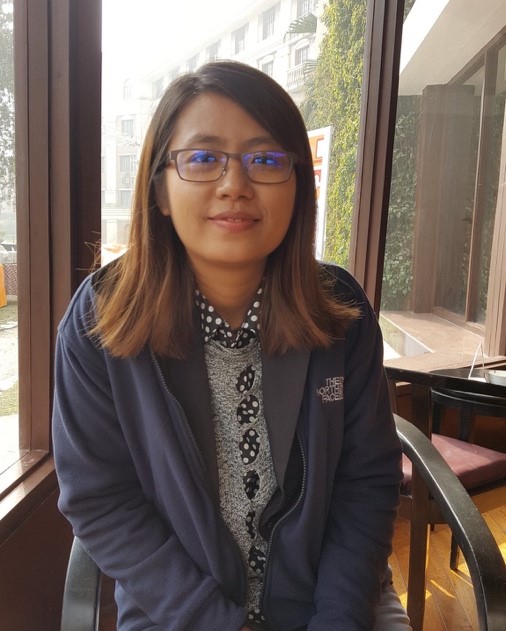 |
 |
 |
MARCH
APRIL
17-19 Apr, Selangor
23-27 Apr, Guam
MAY
5-6 May, Bali
7-9 May, Tehran
THNOG 2018
21 May, Bangkok
ITU Asia-Pacific Regional Development Forum 2018
21-22 May, Bangkok
21-25 May, Bangkok
22-23 May, Bangkok
11th APT Policy and Regulation Forum for Pacific (PRFP-11)
28-31 May, Nadi
JUNE
APEC TEL 57
3-8 Jun, Port Moresby
4-8 Jun, Thimphu
11-14 Jun, Sri Lanka
26-28 Jun, Singapore
27-29 Jun, Shanghai
JULY
8-12 Jul, Bangkok
9-10 Jul, Hong Kong
11-13 Jul, Tsu
14-20 Jul, Montreal
15-17 Jul, Singapore
20 Jul, Singapore
26 Jul, Jakarta
AUGUST
4th Meeting of the APT Preparatory Group for PP-18
21-24 Aug, Kuala Lumpur
30-31 Aug, Sydney
SEPTEMBER
APT Symposium on Spectrum Management
3-5 Sep, Philippines
6-13 Sep, Noumea
11-13 Sep, Ha Noi
APT Symposium on Cybersecurity
12-14 Sep, Seoul
OCTOBER
19th South Asian Telecommunications Regulators' Council Meeting (SATRC-19)
8-10 Oct, Pakistan
|
 |
 |
 |
 |
|
|
 |
This is a monthly e-newsletter published by the Internet Society's Asia-Pacific Regional Bureau. It has updates on the Bureau's activities and features insights on the transforming Internet landscape in and around the Asia-Pacific region.
If you like our e-newsletter, you can share it by clicking on the social media links above.
|
|
Job Vacancy Announcement:
Outreach Manager - Asia-Pacific
|
|
|
This newly created position within the organisation plays a central role in advancing and fulfilling the Internet Society's outreach needs, goals and objectives throughout the Asia-Pacific region. The role requires a highly motivated multi-skilled individual with strong communications skills, including social media. The successful candidate will also have a strong understanding of regional Internet policy issues.
Read More
|
|
ISOC @ APRICOT 2018
|
|
|
Last month in Kathmandu, Nepal, 750 delegates participated in APRICOT 2018 - Asia-Pacific's largest Internet conference. It was led by Internet Exchange Nepal (npIX) with support from several organisations including the Internet Society (ISOC) Nepal Chapter.
ISOC through its Asia-Pacific Regional Bureau is a long-term partner of the APRICOT conferences, sponsoring a competitive fellowship programme, as part of ISOC's mission to support capacity building in developing countries. Take a look at the Profile Feature section (below) showcasing our fellows at APRICOT 2018.
Team ISOC @ APRICOT 2018 comprised of staff from Regional Bureaus and the Internet Technology Office. This included Andrei Robachevsky, Aftab Siddiqui, Rajnesh Singh, Salam Yamout and myself.
In line with ISOC's 2018 Action Plan, our core message at APRICOT 2018 was to strengthen the global Internet routing system and mitigate many of the risks facing the Internet's core today. This includes route hijacking, traffic detouring, and address spoofing - which is a root cause of Distributed Denial of Service (DDOS) attacks. We promoted, the Mutually Agreed Norms for Routing Security (MANRS), a set of recommendations addressing these risks, already adopted by some network operators.
Team ISOC took on a wide variety of roles at APRICOT 2018 and other co-located events, including: chairing and speaking at the AP* Meeting, speaking at the ICANN GAC Regional Capacity Building Workshop, and several other speaking and moderation roles at the conference.
Presence of many of the key people and organisations shaping the Internet in Nepal and Asia-Pacific invited a number of important engagements at APRICOT 2018. Team ISOC had a number of bilateral dialogue with government representatives, ISP associations, network operators and regional Internet organisations.
The ISOC Nepal Chapter chaired our regular ISOC@APRICOT meeting, inviting the community to learn about our work plans and possible areas of collaboration, and share views on broad Internet issues in Asia-Pacific. Several ISOC chapter leaders and members led lively discussions about their work with local communities.
Together with delicious dinners and friendly social gatherings, Team ISOC had great visibility and impact during APRICOT 2018, with several outcomes and opportunities to support one of our KEY actions vital to the Internet's future - securing the Internet's core.
Mark your calendar - APRICOT 2019 will be held in Daejeon, South Korea on 18-28 February 2019.
Naveed Haq
Regional Development Manager, Asia-Pacific
|
|
CERNET and CNGI-CERNET2: The History of China's Digital Transformation in Education and Research
|
|
|
by Jie An, CERNET Center, Tsinghua University, Beijing, China

The
China Education and Research Network (CERNET) is the world's largest academic network. It is constructed and operated by 41 Chinese universities, including Tsinghua University and Peking University, and managed by China's Ministry of Education.
In 1994, the National Planning Commission of China formally approved the CERNET pilot project. As the network centre of CERNET was located at Tsinghua University, the university took the lead to expand the network by collaborating with dozens of universities.
Being the first network to use TCP/IP technology in China, CERNET played a key role in promoting the early development of the Internet in China. Thus, CERNET has been selected as one of top 10 phenomena in Chinese Internet 20 Years, organised by the Internet Society of China.
CERNET has built over 30,000 kilometres of optical fibre trunk and over 22,000 kilometres of DWDM high-speed transport network. Its 10-100 Gbps backbone covers 38 points-of-presence in 36 cities. CERNET connects more than 2,000 universities and academic institutes in 200 cities, serving more than 30 million users. In addition to the development of China's Internet infrastructure, CERNET has supported several digital transformation projects for higher education, including the Online Admission of College Entrance Examination, Digital Library, China Grid and Modern Distance Education.
In 2003, the State Council approved the China Next Generation Internet (CNGI) Programme. Tsinghua University, together with 100 other universities, constructed the CNGI-CERNET2/6IX core backbone networks, and supported various technological research and application development initiatives, connecting over 300 universities and serving about 3 million users.
CERNET and CNGI-CERNET2 are integral to the public service system of higher education in China. They are also crucial infrastructures for the digitisation of education, and essential parts of the national information infrastructure.
Via the CERNET Open Exchange Points in Beijing and Hong Kong, CERNET has direct network connections with other national research and education networks (NRENs) in the Asia-Pacific region, North America and Europe.
CERNET has worked closely with other NRENs in the development of the NREN CEO Executive Forum, which has been a catalyst in advancing the ability of research education networks around the world to provide a whole array services to researchers and educators.
CERNET has a long and close partnership with
Internet2, and has been organising the Chinese American Symposium annually since 1999 to exchange knowledge and promote cooperation.
The relationship between Europe and CERNET also has a long history that can be traced back to the late-1990s when the first link was made with DFN in Germany and JANET in the United Kingdom. This relationship strengthened and expanded Europe-wide in the mid-2000s with the TEIN2/3/4 and ORIENT/ORIENTplus projects.
Since 1995, the CERNET Center at Tsinghua University has sent representatives to work in the Asia-Pacific Internet organisations, and they have been contributing to the Asia Pacific Advanced Network (APAN) since 1999, including the establishment of links to the APAN backbone. CERNET has also been active in supporting the activities of TEIN and Asi@Connect projects in the Asia-Pacific region since 2005.
Thus, CERNET has not only contributed significantly to China's Internet development, but also to regional and global Internet collaborations and initiatives
.
The views and opinions expressed in this article are those of the author and do not reflect the views of the Internet Society.
|
|
Internet Society Chapters in South Asia Organise Webinar on Blockchain
|
|
|
by Amrita Choudhury, Internet Society India Delhi Chapter
The Internet Society Chapters in South Asia organised a webinar on 12 February 2018 to address the upcoming challenges and opportunities of Blockchain. I moderated the
two-hour-long session that comprised of presentations and open discussions among the 36 participants representing most of the Chapters of the region and the Internet Society Asia-Pacific Regional Bureau.
Subhashish Panigrahi from the Internet Society Asia-Pacific Regional Bureau started the webinar with an update on the Internet Society
2018 Action Plan. Next, Dr. Govind, President of the Internet Society
India Delhi Chapter, shared the feedback received from Chapter members on areas they would like the Chapter to focus on, which included the organisation of policy dialogues, webinars and technical sessions in areas related to cybersecurity, privacy and trust, gender and new technologies. Based on these responses, he shared an overview of the Chapter's plans for 2018, including hosting the
India School on Internet Governance 2018 and conducting monthly online discussions.
A pre-recorded
interview with Pablo Hinojosa and Srinivas Chendi of APNIC about APRICOT 2018 and APNIC 45 meetings, and ways for the community to engage in the dialogues was played.
Subsequently, Col. Inderjeet Barara delivered a presentation on
"Blockchain: The Foundation Technology of Future". Post-presentation there was an active discussion among the participants on: the legitimacy of Bitcoin and other cryptocurrencies in different nations of the region, concerns of energy wastage, congestion at the network layer due to the usage of Blockchain technology, examples of applications that are running on Blockchain in India and other countries, and how to get involved, how to avoid bad routes, how to address security challenges, and whether countries or central banks will create their own cryptocurrency in the future.
Many of the Chapter leaders also gave an overview of their areas of focus and planned activities this year:
Naveed Haq from the Internet Society Asia-Pacific Regional Bureau concluded the event, expressing his eagerness to see more of such inter-chapter sessions and cooperation in the region.
|
Meet the APRICOT 2018 Fellows
|
|
|
The Asia Pacific Regional Internet Conference on Operational Technologies (
APRICOT) is an annual event, that brings together Internet engineers and networking experts, government representatives, Internet business leaders, and other interested parties from around the world to learn from training workshops and tutorials, attend technical presentations, discuss policies, and extend social and professional networks with like-minded peers. This year's event was held in Kathmandu, Nepal from 19-28 February.
The Internet Society Asia-Pacific Regional Bureau has a long-term partnership with APRICOT and proudly sponsors its
fellowship programme, providing financial support to individuals from developing economies to attend the event. This year, the Internet Society sponsored 13 fellows to APRICOT 2018 - 10 of them female, endorsing our focus to inspire and facilitate the participation of women in the technology sector and to
#ShinetheLight!
We had an opportunity to meet three fellows from India, Malaysia and Myanmar, to find out more about them and their experience at APRICOT 2018.
 Anand Raje Anand Raje is a Board Member of the
India Internet Foundation and Vice President of the Internet Society
India Kolkata Chapter.
"The APRICOT conference is a great place to meet people, build new connections and share ideas. In my local community in India, we are building a model community
Internet exchange point, which is replicable and can be implemented by the community for the community. It gave me great pleasure to meet fellow network practitioners from the region, and visit Internet Exchange Nepal (
NPIX), one of the pioneering efforts towards a community-driven exchange point. I would like to suggest the set-up of a fellowship alumni network and the organisation of one dedicated session for fellows at the APRICOT conference for experience sharing and guiding newcomers to the community."
 Athirah Rosli Athirah Rosli is a Doctoral Researcher at Universiti Utara Malaysia and Committee Member of the Internet Society
Malaysia Chapter.
"I fully enjoyed the event that was full of interesting sessions and tutorials, and I got to know more about the current status of IPv6 deployment and operations. Moreover, I had the chance to meet researchers, Internet engineers, networking experts, government representatives and technical staff around the globe with mutual concerns and issues regarding the Internet. The experience of attending this conference is a valuable treasure of memory to be cherished in my life."
 Hsu Myat Thwe Hsu Myat Thwe is from Magway, Myanmar. She is a junior network engineer at a local ISP and volunteers at Myanmar Internet Exchange (
MMIX).
"I decided to attend the Network Management and Monitoring Workshop because it is related to my professional experience. Through this workshop, I gained great knowledge about the key concepts of network management and monitoring. I learned useful network monitoring tools, and also made many friends from other countries. I will share my experience with colleagues, and will encourage engineers from Myanmar to participate in APRICOT workshops."
|
Malaysia and Singapore's Fake News Law Proposals Spark Concern
|
Opposition members and tech giants have expressed concern over Malaysia and Singapore's plans to introduce new laws to counter fake news, fearing that the legislation of both countries was a veiled crackdown on dissent. On 21 March, the Malaysian Cabinet approved a Bill to counter fake news, which will be tabled in Parliament before the end of the month.
|
|
|
|
The Indonesian province of Bali has asked mobile providers to shut down customers' access to the Internet during Nyepi, a Hindu holiday known as the Day of Silence. Internet advocates oppose shutdowns, saying they can hurt local economies and endanger users who depend on connections to contact emergency and health services.
|
|
|
|
|
The Marshall Islands will launch the world's first legal tender cryptocurrency after a law passed by parliament. The nation has partnered with Israeli company Neema to issue 24 million units of the Sovereign (SOV) digital currency. It will cap the number to prevent inflation.
|
|
|
|
One out of three women surveyed reported receiving sexual and inappropriate calls or text messages. The frequency of such calls is high: Around 78% received calls with inappropriate and sexual content every week, while 82% reported receiving inappropriate videos and pictures every week.
|
|
|
|
|
Not yet signed up to receive our emails? Join Now
|
|
|